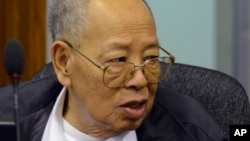WASHINGTON DC - The death of former Khmer Rouge leader Ieng Sary is a reminder that the UN-backed tribunal needs a proper exit strategy as it winds down its work, observers say.
Continued funding woes, the advanced age of the last two leaders on trial and other complexities mean the court might not finish its work as originally intended. That means its administrators should consider what good the court can still do, several observers said.
Ieng Sary, who died at the age of 87 last month, was the former foreign affairs minister for the Khmer Rouge. He died while on trial for atrocity crimes, including genocide, along with the regime’s ideologue, Nuon Chea, and its nominal head of state, Khieu Samphan.
Observers say it was the latest sign that the court has been too slow in its work.
“It is becoming increasingly evident that the [court] may never commence with a trial on the most egregious crimes committed by the remaining leaders of the Khmer Rouge,” Nushin Sarkarati a legal official at Center for Justice and Accountability, told VOA Khmer recently. “The court should therefore establish an exit plan that will maximize its legacy and provide some measure of redress to the victims.”
She suggested the court establish a historical archive of its case files, including evidence and witness statements, for future generations.
“An accessible, easily navigable archive will provide an opportunity for survivors and the public to independently seek the truth, even if a judgment is not reached,” she said.
Much is now at stake for the court, said John Ciorciari, a public policy professor at the University of Michigan. If it is unable to prosecute its second case—the one most likely to explain how the regime functioned—victims will be “rightly disappointed,” he said. “So it’s imperative for the court officials, for the Cambodian government, for the UN, and for donors, to redouble their efforts to complete the case successfully and expeditiously.”
The slow pace of the proceedings and an unwillingness by the Cambodian government to fund staff on the national side of the court have meant little funding coming from international donors, tribunal watchers said.
Peter Maguire, a vocal critic of the court and a Khmer Rouge scholar, said the ability of the court to complete its second case is now in doubt.
“It’s a tragedy, and it’s a missed opportunity, that they have been unable to conclude this trial within the life time of the defendants,” he said.
However, UN Secretary-General Ban Ki-moon continues to support the work of the court, said Eri Kaneko, a spokeswoman for his office.
“The secretary-general continues to strongly support accountability for all those responsible for serious international crimes through a fair and impartial judicial process,” she said. “It is very unfortunate that the victims of the former Khmer Rouge regime and their families, as well as the international community more broadly, will not have the opportunity to see the judicial process run its course and deliver a verdict in the case of Ieng Sary.”
The UN’s special envoy for the tribunal, David Scheffer, who recently visited Cambodia to discuss the process with Cambodian Cabinet Minister Sok An, told WEBZ radio in Chicago that there remain frustrations with delays at the tribunal.
“It’s very frustrating, particularly for the Cambodian people, who want justice to be rendered very quickly for these crimes,” he said. “But the United Nations and foreign governments made the determination that this trial would be operated, to the greatest extent possible, in accordance with the international standard to due process.”
The current case against Nuon Chea and Khieu Samphan is “absolutely imperative,” he said. “This is the Nuremberg trial of Cambodia, right now, and it must be brought to a conclusion.”
Meanwhile, the tribunal continues to look for more funding, following staff walkouts on the Cambodian side earlier this year, and a potential shortfall for the international side next month.
A spokesman for Sok An, who oversees the tribunal for the Cambodian government, said he is looking for ways to reduce the size of the staffing structure as a way to save money. Sok An is also recommending that judges and prosecutors speed up their work, but without short cuts, the spokesman, Ek Tha, told VOA Khmer.
“When we have a clear timeframe and complete strategy to do their work, I think the court will move more effectively and successfully,” he said.
The court has spent more than $150 million since 2006, but it has only managed to try one former leader, torture chief Kaing Kek Iev, who pled guilty from the start.
Given Difficulties, Tribunal Observers Worry Over Exit Strategy
- Sok Khemara
- VOA Khmer







